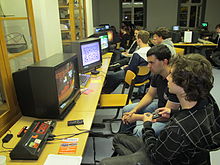
Back Retrogaming German Retrogaming Spanish رترو گیمینگ Persian Retropelaaminen Finnish Retrogaming French Retrogaming ID Retrogaming Italian レトロゲーム Japanese 레트로 게임 Korean Retro-gaming Dutch
This article needs additional citations for verification. (May 2023) |


Retrogaming, also known as classic gaming and old school gaming, is the playing and collection of obsolete personal computers, consoles, and video games. Usually, retrogaming is based upon systems that are outmoded or discontinued, although ported retrogaming allows games to be played on modern hardware via ports or compilations. It is typically for nostalgia, preservation, or authenticity. A new game could be retro styled, such as an RPG with turn-based combat and pixel art in isometric camera perspective.
Retrogaming has existed since the early years of the video game industry, and was popularized with the Internet and emulation technology.[1] It is argued that the main reasons players are drawn to retrogames are nostalgia for different eras,[2] the idea that older games are more innovative and original,[2] and the simplicity of the games.
Retrogaming and retrocomputing have been described as preservation activity and as aspects of the remix culture.[3]
- ^ Heineman, David S. (January 22, 2014). "Public Memory and Gamer Identity: Retrogaming as Nostalgia". Journal of Games Criticism. Vol. 1, no. 1. pp. 1–24. Retrieved February 22, 2016.
- ^ a b "Revival of the Fittest". Next Generation. No. 28. Imagine Media. April 1997. pp. 36–45.
- ^ Yuri Takhteyev; Quinn DuPont (2013). "Retrocomputing as Preservation and Remix" (PDF). IConference 2013 Proceedings. University of Toronto: 422–432. doi:10.9776/13230 (inactive January 31, 2024). hdl:2142/38392. Archived from the original (PDF) on February 13, 2018. Retrieved March 26, 2016.
This paper looks at the world of retrocomputing, a constellation of largely non-professional practices involving past computing technology. Retrocomputing includes many activities that can be seen as constituting 'preservation.' At the same time, it is often transformative, producing assemblages that 'remix' fragments from the past with newer elements or joining together historic components that were never combined before. While such 'remix' may seem to undermine preservation, it allows for fragments of computing history to be reintegrated into a living, ongoing practice, contributing to preservation in a broader sense. The seemingly unorganized nature of retrocomputing assemblages also provides space for alternative 'situated knowledges' and histories of computing, which can sometimes be quite sophisticated. Recognizing such alternative epistemologies paves the way for alternative approaches to preservation.
{{cite journal}}: CS1 maint: DOI inactive as of January 2024 (link)
© MMXXIII Rich X Search. We shall prevail. All rights reserved. Rich X Search